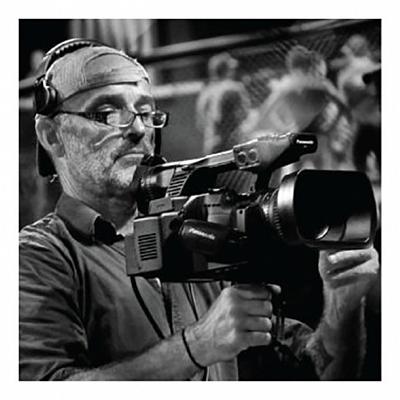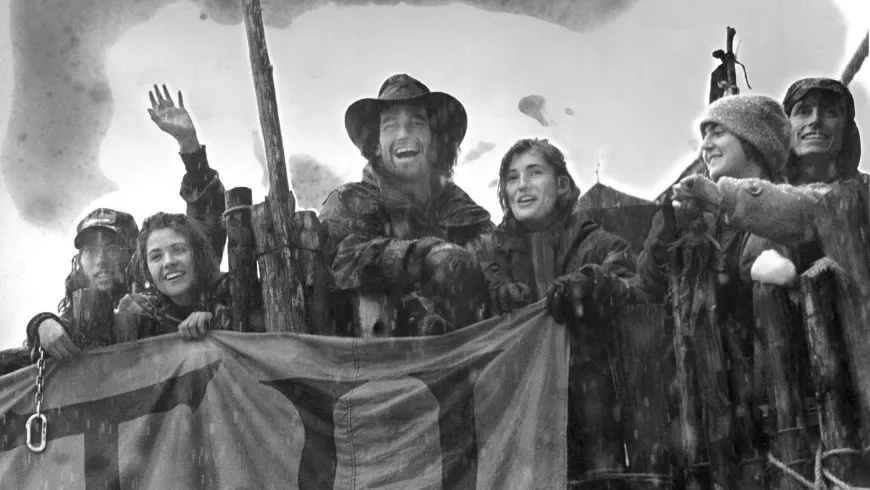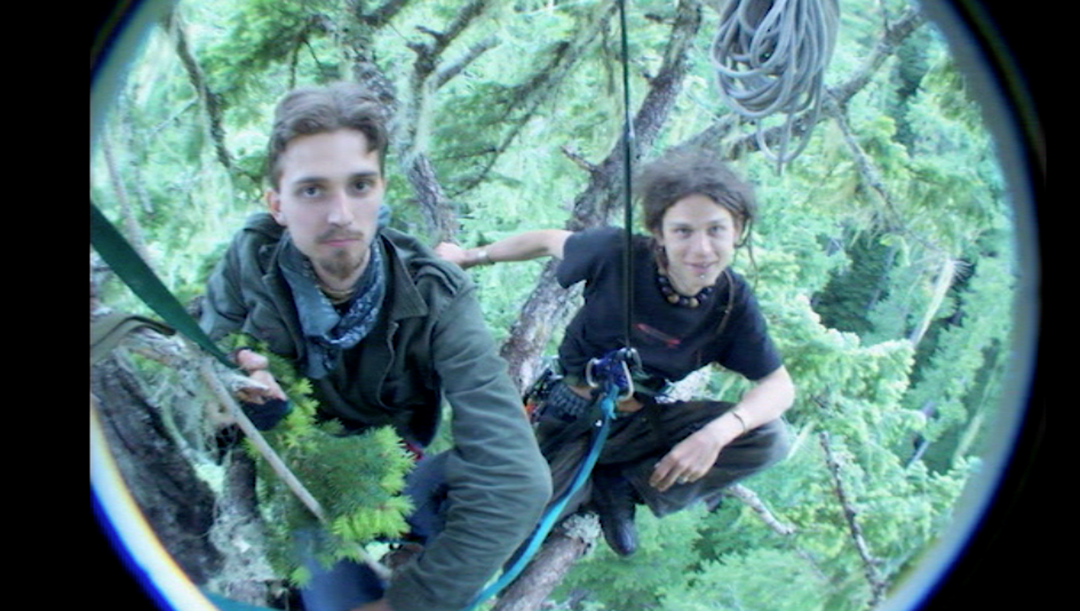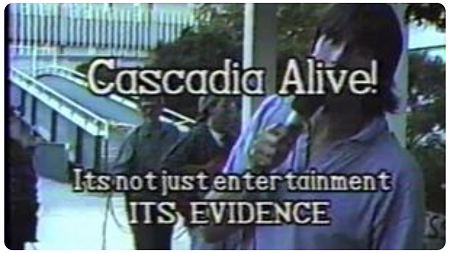
"In a unique time in Oregon’s history, my journalistic style—gonzo, cinéma vérité—has allowed me and my camera to document people that are often overlooked or wary of talking to reporters,” says Tim Lewis.
The Eugene-based documentarian has focused on social protest movements for nearly four decades.

Captivated by the natural landscapes and alternative lifestyles of the Pacific Northwest, Lewis found his subjects, collaborators and inspiration among the local radicals. He was on the scene to record a generation of activists as they advocated—some would say, agitated—for environmental preservation, police accountability, alternative community structures and many other causes.
A key to his method, Lewis believes, is developing familiarity and trust with subjects who often feel reluctant to speak with mainstream journalists.
“These subcultures and their stories would have otherwise been lost and the pages of history incomplete,” he says.
Today, the UO Libraries is raising funds to acquire and archive the life’s work of this local legend, assuring that a vital era of history will remain accessible for future generations of researchers, students, activists and the interested public.
Notwithstanding the countercultural focus of Lewis’ most enduring work, his beginnings as a videographer occurred in a very different space. In 1985, he and a friend formed a production company that specialized in shooting documentary footage on board cruise ships. Their very first contract involved videotaping a 100-day world cruise, providing ample opportunities to sharpen his technical skills in a lavish work environment.
In time, however, his focus would shift from vacation fun on the high seas—to saving Oregon’s old-growth trees. In the early '90s, a trip home to Eugene and a chance barroom encounter led him down a new creative path. Along with the switch in subject matter came a big change in lifestyle.
"I went from champagne and caviar to dumpstered bagels and cheap beer,” Lewis recalls.
“I embedded myself in an Earth First campaign that blockaded a logging road for over a year to prevent the salvage logging of Warner Creek, just east of Oakridge. Then I took this gonzo journalism style into town and helped the radicals of Eugene create their own media.”

His Warner Creek footage would become a foundation for Cascadia Alive!—a long-running, weekly alternative news program that debuted on community cable in 1996—and an influential, feature-length documentary about the blockade, pickAxe, released in 1999.
In the following years, Lewis directed an account of local activists' participation in the incendiary 1999 Seattle protests, Breaking the Spell: Anarchists, Eugene, and the WTO, and collaborated on the Academy Award-nominated 2011 documentary, If a Tree Falls: A Story of the Earth Liberation Front. He also played a key role in establishing alternative media and community resources like Eugene Copwatch, Cascadia Media Collective and pictureEugene. His recent projects include documenting COVID-19's impact on community life in Eugene's eclectic, free-spirited Whiteaker neighborhood, and a video series on efforts to feed the city's houseless population.
“With all the dramatic conflicts among police, liberals, politicians and the radicals in Eugene during the 1990s, it was ripe for a video producer to try to tell these stories from a radical and different perspective,” Lewis says. “That’s what I’ve tried to stay true to over the past 35 years.”
Story by Jason Stone | B&W photo of Tim Lewis by Daniel Dronsfield | Group photo at Warner Creek in the rain by Kurt Jensen | Tree sitters photo by N.E.S.T.

Inspired by this opportunity, UO Libraries created the Special Collections Social Protest Fund, dedicated to curating Tim Lewis’ archives and others like his
Adding the Tim Lewis collection to the UO’s archives means future generations of researchers and storytellers will have access to rare, documented history.
Cascadia Alive: a Eugene revolution, now re-televised

Before there was YouTube, there was Cascadia Alive! Co-created by Tim Lewis and activist organizer Tim Ream (JD '10), Cascadia Alive! was a weekly alternative-news program produced for cable access television in Eugene from 1996-2004. The show’s slogan: “It’s not just entertainment; it’s evidence.”
Viewed through the lens of today, the program—digitized and made available to watch on the library’s Aviary platform—offers a fascinating window to our recent past. It represents an era when environmentalist, anti-authoritarian and anti-capitalist voices were ascendant, and local issues influenced national movements.
Spanning 268 hour-long episodes, Cascadia Alive! documents the perspectives, personalities and passions of the Pacific Northwest’s activist community across a period of historic transformations. Featuring segments from independent journalists, in-depth discussions with provocative guests, and a nostalgic staple of pre-internet social networking: the live call-in segment.
Testimonials
“Tim Lewis' video archive is likely the single most important collection documenting direct action movements in the Pacific Northwest during the 1990s and early 2000s . . . This grassroots archive, filmed by activists that participated in these movements during their height, provides a unique, firsthand account of the unrest and activism: its impact, its energy, its victories and its failures."
Luke Ruediger, environmental activist and author
"Unconstrained by deadlines and the time limitations imposed on TV reporters and photographers in broadcasting their stories, Tim Lewis was able to document these events at length and provide depth of coverage that local television news could not match . . . He has a practiced eye, is a skilled interviewer and earned a reputation for being credible and persistent. These qualities have provided him with unique access and a one-of-a-kind, vast visual record of people, issues and events often not adequately explored or reported by mainstream television and print outlets."
Bill Goetz, Eugene, Oregon TV news photographer and producer, 1979-2012
“Tim Lewis’ archive is an invaluable asset to historians, sociologists and documentary filmmakers. It provides incredible intimate access into the activist community that was based in and around Oregon in the 1990s and 2000s, and it would have been impossible for me to make the Academy Award-nominated documentary If a Tree Falls: A Story of the Earth Liberation Front without Lewis’ archive . . . I know this archive will continue to be a critical source for anyone hoping to understand that dynamic period in America's history.”
Marshall Curry, Academy Award-winning filmmaker
“Timothy Lewis has served as a chronicler of the history and conscience of our region for decades . . . His love for natural ecosystems is evident and he keeps his heart and his lens focused on our need to preserve the beauty and functions of this place we are blessed to call home. No one, to my knowledge, has done this work so steadfastly as Tim Lewis.”
Reverend Dawn Marie Reynolds, Eugene Police Auditor 2008-2010
